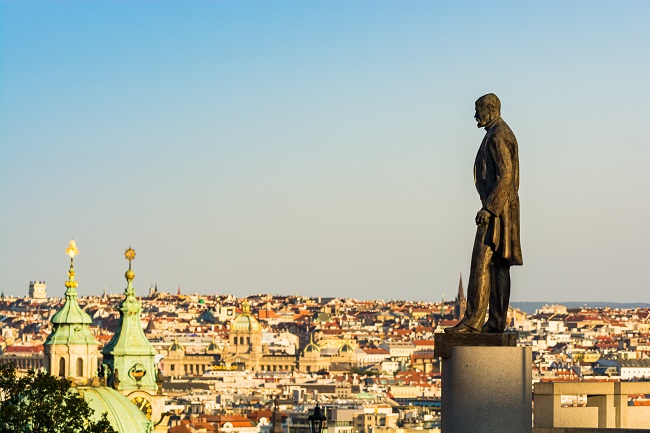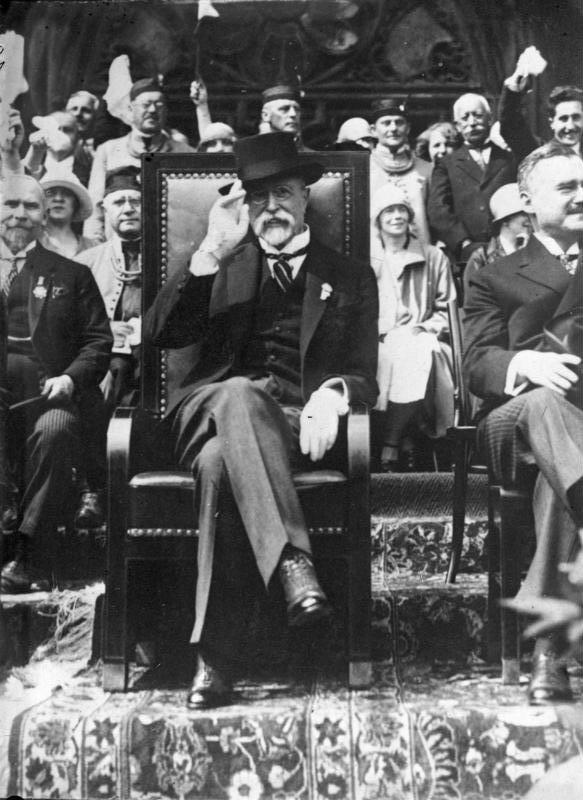He knew the difference between nationalism and patriotism and was considered the anti-Lenin of Central Europe
by Amedeo Gasparini
Tomáš G. Masaryk was one of the most important statesmen of the first half of the twentieth century. He has a remarkable story of social and intellectual elevation. From a small town in the Austro-Hungarian Empire to Prague Castle, as a father and founder of the First Czechoslovak Republic. There is no village, street or square in the Czech Republic that doesn’t bear his name today. Academician and philosopher, he transformed humanism and tolerance, respect for fundamental freedoms and self-determination of people, into a philosophy and personal conduct.
Masaryk, one of the greatest intellectuals of his time, never forgot his common roots, often siding with the oppressed, minorities, and the poor. He was born in Hodonín (South Moravia), two years after the rebellions of 1848, when the Czech lands rebelled against the centralism of Vienna to obtain greater autonomy. Seven decades will still be necessary for this to happen.
Son of a coachman and a cook, the young Masaryk didn’t initially have adequate education, but he loved to read. Then, he managed to get accepted in a school in Brno with a scholarship. He excelled in philosophical and religious fields, but also in German and Greek. Then, he went to Vienna and registered in the Faculty of Philosophy. He was very fond of the works of Plato and Edmund Husserl. In 1876, he delivered his doctorate dissertation in German, and the same year he met Charlotte Garrigue, a young music student passionate about Richard Wagner, in a guest house in Leipzig, attended by American travelers. Here, Charlotte was teaching English lessons to the owner’s daughter. At the Spa of Elgersburg, Masaryk sent her a letter with a marriage proposal. The two of them married in Brooklyn, in 1878; Garrigue Senior helped the couple financially. They returned from the United States to the Czech lands.
As a professor in Prague, at the Masaryk University, he spoke not only about sex education and prostitution, but presented his theses aimed at autonomy from Vienna. He loved being among intellectuals and students. He criticized and denounced the flaws of the Habsburg system, as well as the occupation of Bosnia-Herzegovina. In the 1980s, that were still marked by the romantic movements of 1848, Masaryk took strong and countercurrent positions – he defended Leopold Hilsner, the Bohemian Alfred Dreyfus, unjustly accused of murder. He wrote about Czech autonomy, criticizing the management of the Slovak minority in the empire. Elected in Vienna, in 1891, he left the Parliament two years later, and in 1900 he founded a small party with independent objectives. He returned in the Parliament seven years later. He made friends with Karel Čapek – both of them died in the same year – and in 1915 he began to make plans for the Czechoslovak federation, promoting his movement also abroad.
Impressed by the ideas of Masaryk, Woodrow Wilson supported the projects of the intellectual, also useful for the weakening of the Danubian monarchy. Masaryk favored the unitary state. He wanted a democracy within a system of democracies. He knew the difference between nationalism and patriotism and was considered the anti-Lenin of Central Europe, due to the peaceful method with which he later obtained the independence of Czechoslovakia. If the Bolsheviks took power in Russia by strength, hatred and violence, Masaryk showed the world that peace, agreements, compromises and tolerance are the ones to lead to a juster State and to a free and mature citizenship. Masaryk knew the risks and the weaknesses of the new nation. Therefore, he demanded that the fellow citizens strengthened their institutions from their base. This made him an enemy and a natural target for the Nazis, at first, and then for the Communists.
He also said once that the soul of the country must reflect more of Jesus Christ than Julius Caesar. And this was revolutionary in those twenty years between the two wars – when it was violence that dictated the rhythms of politics. Masaryk expressed himself in Kantian fashion for an individualistic enlightenment. He wanted to implant this feeling in the future Czechoslovak nation. He proved to be very modern for his time: statesman, academician, philosopher and writer, he was first of all a humanist. His concept of “revolution of hearts and minds” was then dusted off by Václav Havel to awaken the collective consciences in society. Masaryk inspired the last president of Czechoslovakia also in the paradox of the
so-called “non-political politics”. According to Rob McRae (Resistance and Revolution), Masaryk believed that one of the problems of his era was that the European political culture was not founded on a common spirit of humanism or morality.
His conception of humanism was impregnated by Immanuel Kant (Zum ewigen Frieden) and John Stuart Mill (On Liberty, but above all The Subjection of Women). It was based on the recognition of rights and dignity of human beings; on tolerance and diversity of talents. Masaryk declared himself for the dissemination of knowledge, culture, defense of minorities – essays written between 1899 and 1900 that condemned Antisemitism are well known. Masaryk knew the divisions between Czechs and Slovaks, but he looked at the United States as a mix of ethnic groups also in an attempt of federalization in a new republic. Even his son, Jan Masaryk, would have experimented with the Atlantic connections between Prague and Washington. In September 1918, Masaryk said that the new Czechoslovak state gave the Jews equal rights. In The New York Times he wrote that he respected Zionism as a non-chauvinist movement that represented the rebirth of the Jews.
After the Pittsburgh Agreements, for the first time in the Czech and Slovak history, they enjoyed a State belonging all to them. Masaryk had become the father of the nation – sponsored by Wilson at the expense of the Habsburg Empire. The Czechoslovak Republic became independent at 9:45 on Monday, October 28, 1918 in Wenceslas Square, in Prague. In December, same year, Masaryk settled down in the capital city. Everyone wanted to meet him, but some criticized him for his Czech preferences at the expense of the Hungarian, Polish, German and Ruthenian minorities. The Czechs were only half of the country: Masaryk needed to make compromises. He also studied the Swiss Federalist model, but then centralized the power in Prague in a sort of liberal oligarchy vis-à-vis the minority mosaic in the country. The modernization of Prague coincided with the arrival of Masaryk at the Castle. The urbanization, recalls Peter Demetz (Prague in Black and Gold), was incisive in the late 80s.
Then, the government wanted to create a sanitization plan of the Old City. Masaryk also did something similar from 1918 onwards. Jan Neruda had described the Jewish neighborhood as the paradise of crime, exploiters and prostitution. It was the years under Masaryk that transformed Prague into a mystical and attractive place. In the 1920s, the president also reached an agreement of mutual defense with France – the position that Paris assumed regarding Prague, less than twenty years later is well known. Masaryk’s health became a metaphor of Czechoslovakia’s health. The Sudetes were particularly touched by the depression of 1929 and the president was accused of ignoring their requests. The Sudetes Party of Konrad Heinlein criticized him a lot and began to demolish the fragile architecture of the young Czechoslovak state. The elderly Masaryk was re-elected in 1934, due to the absence of other credible candidates.
In December 1935, he left the presidency to Edvard Beneš, friend and pupil. Tomáš G. Masaryk (the “G” stands for Garrigue: the president adopted the surname of his wife to underline the importance of the feminist movement and the condition of the women) died just under two years later, in September 1937. He was eighty-seven years old. Thousands came to Prague from all over the Czech Republic for the last farewell to the president who had made them free. At the last moment, Heinlein announced he was sick and didn’t attend the funeral – he was represented by the deputy Karl Hermann Frank. The disappearance of Masaryk facilitated the absorption of the Sudetes territories by Berlin – exactly a year later, with the sale of lands to Germany, in Munich – and the destruction of the liberal state. Fortunately for him, he didn’t witness the dismemberment of 1938-1939. He wouldn’t have accepted it, after half a life spent fighting for the independence cause.







